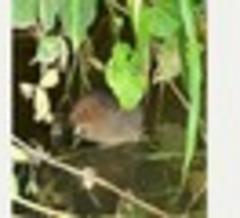 This is Devon --
This is Devon --When most readers viewing this article were young, water voles were common in the Westcountry – now they are rare. So rare, that they've been extinct in Cornwall for over a decade.
But a pioneering project developed by a new nature conservation charity – Westland Countryside Stewards – is now on course to return one of Britain's best loved mammals to the riverine landscapes west of the Tamar.
In early 2013, more than 300 captive-bred water voles were released at a number of locations on the River Strat above the Bude Marshes.
Experts say that the next 12 months will determine whether or not the reintroduction has been a success.
"Although there is ample field sign evidence of their survival – distinctive latrines, feeding piles of chopped vegetation and visible bank-side burrows – 2014 should be the first year when baby water voles will once again be born in Cornwall after an absence of 18 years," says Derek Gow, a wildlife expert from Devon who has been involved with the scheme.
"This once common species is now believed to have suffered a range decline in excess of 97% in Britain, with recent population estimates suggesting that the national population may now be less than 200,000 individuals," Mr Gow told the Western Morning News.
"Without intervention, the prospects for the survival of the water vole in Britain are grim. While it is possible that they may survive for a time in 'ideal' landscapes, such as the Somerset Levels where extensive ditch networks and large-scale wetlands still remain, in less suitable habitats they will simply cease to exist."
Water voles survive on a largely vegetarian diet and have been recorded feeding on over 227 different species of plants. They live in complex burrow systems in the banks of watercourses where they construct chambers for nesting and storing their food.
Where these features are undisturbed they can be very old. They do not hibernate and instead rely on gathered winter food stores to tide them through the winter months.
John Duncan, of Westland Countryside Stewards, added: "In Roman and medieval times water voles were found living far from water in underground environments – like moles. They fed on plant roots and green vegetation as they still do in modern Europe.
"It is very likely that the intensity of developing agriculture forced them from this wider environment in Britain into the river corridors."
A survey 24 years ago found that water voles in Cornwall enjoyed 15.5% occupancy of surveyed sites – by 1996, a second research project discovered this had declined to a 1.9% occupancy.
Mr Duncan added: "Extensive surveys undertaken by Cornwall Wildlife Trust have identified no surviving populations and the species is now believed to be extinct in the county.
"Although their reintroduction has been discussed for many years this project is the first of its type in Cornwall.
"The nearest population is on the River Tale near Honiton in West Devon," he added. "There is no practical possibility of natural recolonisation."
The 22.5 acres of Bude Marsh is managed by Cornwall Council's countryside department and the main marsh has been designated as a Local Nature Reserve (LNR). The wetland area is being seen as an ideal base for the project.
The water voles for the project were bred at Mr Gow's farm in Devon and were introduced to the catchment with the help of "soft-release" pens.
Fraser Proudfoot, of the Weir Wildlife Centre and Bistro, located near to Bude Marsh, told the WMN: "We're proud to report that water voles are back in the wild in Cornwall for the first time since their extinction in the 1980s or 90s from mink predation. Prior to this, the Bude valley was a stronghold for these iconic creatures made famous in the tale Wind in the Willows as Ratty, with his mates Toad, Mole and Badger.
"The Weir reed beds and Whalesborough riverbank along the Neet river – which still had the original but long disused vole burrows – will hopefully soon be re-used," he added. "Westland Countryside Stewards have planned the reintroduction preceded by months of careful monitoring and study to be sure mink are no longer in the area."
Neil Cox, a trustee for the charity, added: "Cornwall's water vole population is now facing a promising future thanks to the efforts of our team. Helping to promote the conservation, protection and improvement of our natural environment is one of our main aims. So, with the drive and enthusiasm of not only our team but the local community, we can build on the good work already achieved in such a short period of time."
To learn more about the charity visit www.westlandcs.co.uk Reported by This is 2 hours ago.